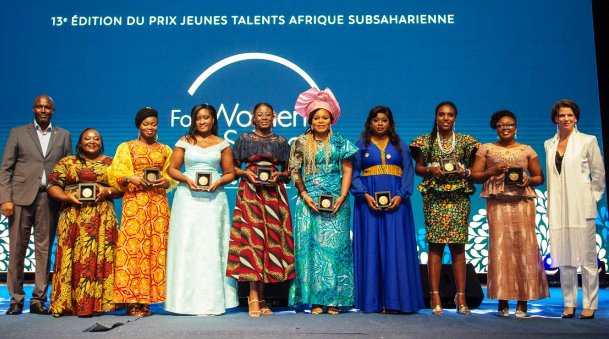The Fondation L’Oréal and UNESCO is honouring 30 African women scientists as winners of the 14th L’Oréal-UNESCO For Women in Science Young Talents Sub-Saharan Africa Awards. The annual ceremony is being hosted this year in Kasane, Botswana, on 9th November.
RELATED: Valued At Work: A blueprint for inclusion and retention of women in STEM
Each year, the L’Oréal-UNESCO For Women in Science Young Talents Sub-Saharan Africa Awards recognize and support African women scientists for the excellence of their scientific research.
For its 14th edition, 25 PhD candidates and five post-doctoral researchers will be rewarded at an event graced by President of Bostwana, Mr. Mokgweetsi Masisi.
Women scientists, an opportunity for the African continent and the entire world
At a time when the empowerment of promising young women scientists has never been more crucial, global efforts in research are still lagging behind. Scientists in Africa represent only 2.5% of the world’s researchers[1]. In a world where social, political, economic and environmental crises are escalating every day, harnessing all scientific talents is now vital to ensuring a fairer, more sustainable future for the continent.
For the 14th year, the Fondation L’Oréal and UNESCO seek to reinforce their commitment to promote gender equality in science by rewarding 30 young talented women researchers – an increase of 10 awards compared to previous years. They have been selected for their scientific excellence among 632 applicants by a jury of 10 members led by Professor Aggrey Ambali, Director of Technical Cooperation and Program Funding at the African Union Development Agency, AUDA-NEPAD. Each one of them is a real source of pride for the 17 countries they represent, including Cabo Verde and Lesotho, represented for the first time this year. These scientists represent a source of hope for the future of the world, through their careers and relentless determination.
As bearers of hope and innovative solutions for the African continent, the 30 scientists of the L’Oréal-UNESCO For Women in Science 2023 Young Talents Sub-Saharan Africa Awards are investing in multiple fields of research. Using unprecedented approaches, they tackle major challenges to improve the quality of life in Africa and worldwide.
“The future of Africa is in the hands of its scientists,” says Fanta Yadang Sabine Adeline, one of the 2023 Young Talents.
Fanta is not an exception. The thirty 2023 young talents – biochemists, epidemiologists, ecologists, artificial intelligence experts and public health specialists – are all committed to finding long-lasting solutions to Africa’s diverse challenges. They are all a real source of inspiration for future generations.
Providing role models for the young generation is fundamental. On the morning of 8th November, the Young Talents will engage with the First Lady of Botswana, H.E. Mrs Neo Jane Masisi, and more than 150 school students in an intergenerational conversation and knowledge exchange that will pave the way for a brighter future in science.
Winners of the 2023 L’Oréal-UNESCO For Women in Science Young Talents – Sub-Saharan Africa
Southern Africa
Bhamini SREEKEESSOON, Ph.D. student in Engineering Sciences and Technology – ‘Harnessing tidal energy to power Mauritius’ future’ – Mauritius
Bonolo Bonita PHINIUS, Ph.D. student in Life and Environmental sciences – ‘Shining a light on pathways to fight hepatitis B in Botswana’ – Botswana
Constance CHINGWARU, Ph.D. student in Life and Environmental sciences – ‘Creating biopesticides from native plants to protect maize crops’ – Zimbabwe
Felicidade NIQUICE, Ph.D. student in Life and Environmental Sciences – ‘Promoting occupational health and safety in Mozambique’s hospitals’ – Mozambique
Maria Nelago KANYAMA, Ph.D. student in Formal Sciences – ‘ Harnessing artificial intelligence to fight water scarcity’ – Namibia
Mesha MBISANA, Ph.D. student in Physical Sciences – ‘Improving food safety to promote better health in Africa’- Botswana
Nthabeleng HLAPISI, Ph.D. student in Physical Sciences – ‘Developing innovative phototherapies to treat cancer’ – Lesotho
Central Africa
Fanta Sabina Adeline YADANG, Post-doctoral fellow in Life and Environmental Sciences – ‘Exploring medicinal solutions to neurogenerative diseases’ – Cameroon
Hadidjatou DAIROU, Ph.D. student in Life and Environmental Sciences – ‘Harnessing the power of native plants to treat cardiovascular disease’ – Cameroon
Lydie Kamga MESSADO, Ph.D. student in Life and Environmental Sciences – ‘Conserving orchids in the Cameroon rainforests’ – Cameroon
East Africa
Cheryl KERAMA, Ph.D. student in Life and Environmental Sciences – ‘Exploring how sugar regulation impacts tuberculosis’ – Kenya
Devotha Godfrey NYAMBO, post-doctoral fellow in Engineering Sciences and Technology – ‘Leveraging machine learning to prevent infectious diseases in livestock – United Republic of Tanzania
Esther UWIMAANA, Ph.D. student in Life and Environmental Sciences – ‘Towards a vaccine for tuberculosis’ – Uganda
Faith NJERU, Ph.D. student in Life and Environmental Sciences – ‘Developing novel diagnostics to conserve Kenya’s maize crops’ – Kenya
Hemen Tesfaye Gelaw, Ph.D. student in Life and Environmental Sciences – ‘Fighting antimicrobial resistance in food supply chains’ – Ethiopia
Mwende Mbilo, Ph.D. student in Physical Sciences – ‘Innovating to improve solar energy solutions in Kenya’ – Kenya
Naelijwa Mshanga, Ph.D. student in Life and Environmental Sciences – ‘Promoting better nutrition among women and children’ – United Republic of Tanzania
Grace UMUTESI, Ph.D. student in Life and Environmental Sciences – ‘Promoting women’s health through improved HPV vaccination coverage’ – Rwanda
West Africa
Aderonke KOREDE, Ph.D. student in Life and Environmental Sciences – ‘Exploring the health benefits of natural ingredients’- Nigeria
Bernice Konadu AGYEMAN, Ph.D. student Life and Environmental Sciences – ‘Improving drinking water quality in Ghana’ – Ghana
Dorcas Atibilla, Ph.D. student in Life and Environmental Sciences – ‘Shining a light on mosquito behaviour in the fight against malaria’- Ghana
Emma Edinam KPLOANYI, Ph.D. student in Life and Environmental Sciences – ‘Taking strategic action to eliminate hepatitis B and C in Ghana and beyond’ – Ghana
Fatou Lo Niang, Ph.D. student in Formal Sciences – ‘Leveraging machine learning to help prevent cardiovascular pathologies in Africa’ – Senegal
Ini ADINYA, Post-doctoral fellow in Formal Sciences – ‘Harnessing mathematics to optimise investments’ – Nigeria
Jedidah Jacob AKAWU, Ph.D. student in Life and Environmental Sciences – ‘Conserving the plants and pollinators of the Nigerian savannah’ – Nigeria
Kafayath Ariounke FABIYI, Ph.D. student in Life and Environmental Sciences – ‘Leveraging genomic science to overcome bacterial resistance’ – Benin
Mary AMOAKO (born ADJEPONG), Post-doctoral fellow in Life and Environmental Sciences – ‘Exploring how nutrition stands to impact birth deformities’ – Ghana
Pamela Borges, Post-doctoral fellow in Life and Environmental Sciences – ‘Advancing research in breast cancer through gene research’ – Cabo Verde
Rahimat Oyiza YAKUBU, Ph.D. student in Engineering Sciences and Technology – ‘Advancing clean energy in Nigeria’s universities and hospitals’ – Ghana
Temitope ABIOLA, Ph.D. student in Physical Sciences – ‘Leveraging metabolic engineering to improve the efficiency of biodiesel’ – Nigeria
About the L’Oréal-UNESCO Young Talents Sub-Saharan Africa Programme
Established in 2000, the national and regional L’Oréal-UNESCO For Women in Science Young Talents programs annually provide over 250 grants in more than 110 countries. Their aim is to empower women scientists to pursue their career, and more broadly to promote and highlight the crucial importance of women in science.
“UNESCO is deeply committed to supporting gender equality in science for the benefit of society and to championing scientific excellence worldwide. During the 25 years of our partnership with the Fondation L’Oréal, we have recognized and rewarded over 4,100 women scientists at different stages of their career for their exceptional contribution to scientific progress. The L’Oréal-UNESCO Young Talents are the very future of science. We look forward to working with them and with our partners to continue reinforcing the pivotal role of women in science for a sustainable, inclusive future for all.” says Lidia Brito, Assistant Director-General for Natural Sciences at UNESCO.
The L’Oréal-UNESCO For Women in Science Young Talents Sub-Saharan Africa Awards enable its laureates to benefit from financial support to help them conducting their research projects – grants of €10,000 for PhD candidates and €15,000 for post-doctoral researchers. The 2023 Young Talents’ cohort will join a community of more than 200 African researchers who have been supported and honoured since the creation of this regional program in 2010.
To address the many challenges faced by women scientists, particularly related to gender discrimination and stereotypes, or finding a balance between professional and personal life, the program goes beyond funding. The Fondation L’Oréal provides the Young Talents with the opportunity of undertaking a leadership training to foster their personal and professional development.
“Enabling women scientists to emerge in the public arena and be recognized for the quality of their work requires urgent action. It’s everyone’s responsibility – institutions, companies and civil society. Neither Africa nor the world can successfully respond to the environmental, societal, health crises of our time by depriving itself of half of the humanity.” says Alexandra Palt, CEO of the Fondation L’Oréal





























